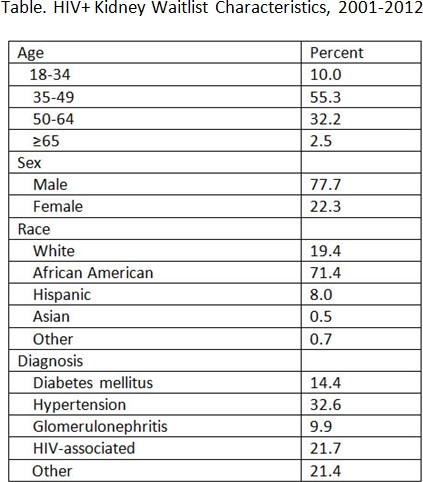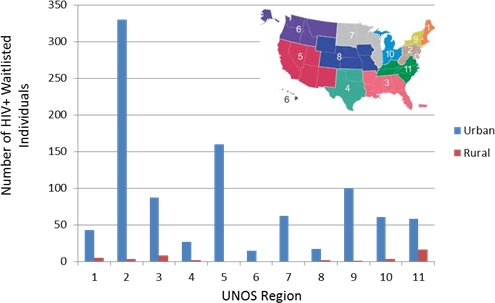Geographic Differences in HIV+ Kidney Transplant Waitlist Characteristics
J. Locke,1 S. Gustafson,2 C. Durand,3 J. Snyder,2 B. Shelton,1 R. Reed,1 P. MacLennan,1 S. Mehta,1 A. Nellore,1 D. Segev.2,3
1University of Alabama, Birmingham, Birmingham, AL
2SRTR, MMRF, Minneapolis, MN
3Johns Hopkins University, Baltimore, MD.
Meeting: 2015 American Transplant Congress
Abstract number: D268
Keywords: HIV virus, Kidney transplantation, Waiting lists
Session Information
Session Name: Poster Session D: Viral Infections
Session Type: Poster Session
Date: Tuesday, May 5, 2015
Session Time: 5:30pm-6:30pm
 Presentation Time: 5:30pm-6:30pm
Presentation Time: 5:30pm-6:30pm
Location: Exhibit Hall E
Kidney transplant (KT) is now a viable option for select HIV+ end-stage renal disease (ESRD) patients. As OPTN does not collect HIV status at waitlisting, no study has examined the epidemiology of HIV+ candidates awaiting KT. IMS pharmacy fills (1/1/01-10/1/12) were linked with SRTR data. IMS Health pharmacy data include roughly 75% of medication fills in the US. KT candidates who filled >1 antiretroviral medication unique to HIV treatment were identified (n=938); 94% had >1 HIV+ medication fill. Simultaneous listings were collapsed and HIV+ waitlist candidates were linked to US census data. Rural/urban setting was defined by Rural Urban Commuting Area zip codes. Geographic differences in descriptive characteristics were compared across UNOS-defined regions and in rural vs. urban settings. Of HIV+ KT waitlist candidates, 65.3% were aged < 50 years; more than two-thirds were male (77.7%) and African American (71.4%). Hypertension was the most common cause of renal failure (32.6%), then HIV-associated nephropathy (21.7%) (Table). Number of HIV+ waitlist candidates varied significantly by region. Most candidates were from urban settings; three regions have never listed an HIV+ candidate living in a rural setting (Figure). Most HIV+ waitlist candidates were young African American males. At least one HIV+ candidate was listed for KT in all 11 UNOS regions. Most candidates were from urban settings, and three regions have never listed an HIV+ candidate from a rural setting, yet 8% of HIV+ patients in the US live in rural settings. These findings suggest possible geographic disparities in access to KT among rural HIV+ ESRD patients. 

To cite this abstract in AMA style:
Locke J, Gustafson S, Durand C, Snyder J, Shelton B, Reed R, MacLennan P, Mehta S, Nellore A, Segev D. Geographic Differences in HIV+ Kidney Transplant Waitlist Characteristics [abstract]. Am J Transplant. 2015; 15 (suppl 3). https://atcmeetingabstracts.com/abstract/geographic-differences-in-hiv-kidney-transplant-waitlist-characteristics/. Accessed February 23, 2026.« Back to 2015 American Transplant Congress
